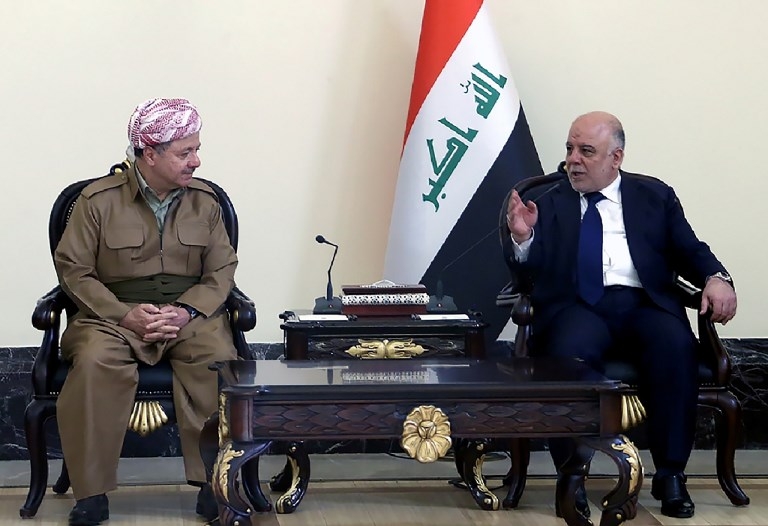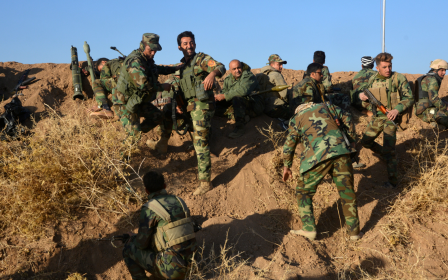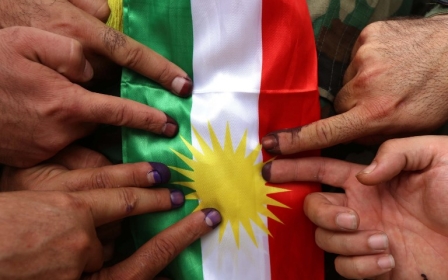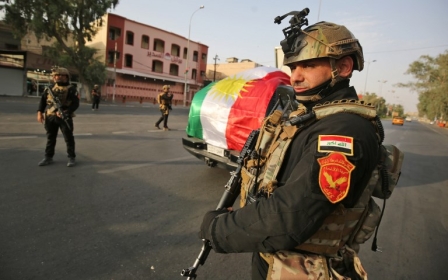Iraq PM denies attack plan as tensions rise with Kurds

Iraq's prime minister on Thursday denied an attack on the Kurds was imminent, in a bid to defuse tensions that had prompted Kurdish peshmerga fighters to temporarily seal off road links with the rest of the country.
"We are not going to use our army to fight our people or to make war on our Kurdish citizens or others," Haider al-Abadi said.
"Our duty is to preserve the unity of our country, to implement the constitution, and to protect citizens and national forces," he told a meeting of tribal leaders from the western province of Anbar.
The rise in tensions came two weeks after Kurdish voters overwhelmingly backed independence in a non-binding referendum that the central government condemned as illegal.
Iraqi Kurdish forces closed the two main roads connecting Arbil and Dohuk with the northern city of Mosul for several hours, a Kurdish military official said.
"The closure was prompted by fears of a possible attack by Iraqi forces on the disputed areas," held by Kurdish forces but outside the autonomous Kurdish region in the north of the country, the official said.
Kurdish authorities said late Wednesday they feared Iraqi government forces and allied paramilitary units were gearing up to launch an assault on the autonomous region.
"We're receiving dangerous messages that the Hashed al-Shaabi (paramilitary forces) and federal police are preparing a major attack from the southwest of Kirkuk and north of Mosul against Kurdistan," the Kurdistan Regional Government's Security Council said.
'We are fighting a single enemy'
Security sources said Thursday that Iraq's elite Counter Terrorism Service and Rapid Response Force had deployed more forces near peshmerga positions around Rashad, a village some 65km southwest of Kirkuk city.
The oil-rich province of the same name, areas of which took part in the referendum, is disputed between the Kurds and Baghdad.
Iraq's Joint Operations Command, which groups all pro-government forces, played down the tensions, expressing confidence that dialogue would resolve the problem.
"Our mission is clear: we are fighting a single enemy, Daesh," Brigadier General Yahiya Rassul said, using an Arabic acronym for the Islamic State group.
"All that interests Iraqis... is to liberate our country and beat the terrorist group," he said. "We do not forget the role played by the peshmerga."
He said Iraqi government forces had previously operated close to peshmerga lines near the northern city of Tal Afar.
Asked if there had been movements of Iraqi forces close to peshmerga positions, Colonel Ryan Dillon, spokesman for the US-led coalition battling IS in Syria and Iraq, said: "We don't see that."
The coalition has worked with both peshmerga and Iraqi pro-government forces in the battle to oust IS from areas of Iraq it seized in mid-2014.
"Our mission is clear - to defeat Daesh," Dillon said.
"We have done that throughout Iraq. We will support the Iraqis in the same way we have in the last three years to make sure that Daesh is defeated".
Ties cut
Central authorities severed ties between the Kurdish autonomous region and the outside world after the referendum by cutting international air links.
Neighbouring Turkey and Iran, which fear that Iraqi Kurdish moves towards independence could fuel demands from their own sizeable Kurdish communities, have also threatened to close their borders to oil exports.
An Iraqi court on Wednesday ordered the arrest of senior Kurdish officials responsible for organising the referendum, saying they had done so "in contravention of a ruling by the Iraqi supreme court".
The warrant is likely to prove toothless as Baghdad's security forces do not operate inside Kurdistan, but it could stop the officials leaving the region.
Iraq has also launched a probe into Kurdistan's lucrative oil revenues and pledged to expose "corrupt" officials in the region who might have illegally monopolised the market.
Middle East Eye propose une couverture et une analyse indépendantes et incomparables du Moyen-Orient, de l’Afrique du Nord et d’autres régions du monde. Pour en savoir plus sur la reprise de ce contenu et les frais qui s’appliquent, veuillez remplir ce formulaire [en anglais]. Pour en savoir plus sur MEE, cliquez ici [en anglais].




